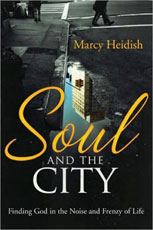"For many people, a fast-moving throng seems to hum with excitement or pulse with energy. A friend says that he experiences a stronger sense of the life force on crowded city streets than anywhere else. He thrives on the human diversity and the pace that a metropolis offers.
"For others, though, urban crowds mean congestion, chaos, jostling, and stress, none of which seem conducive to spirituality. Another friend says she thinks of herself 'ricocheting off the elbows of strangers' as she navigates her way through big-city streets. Another likens a crowd to a herd of bison, ready to stampede.
"There's even a term called 'crowd-sickness,' which may especially affect those with sensitive, empathetic natures: the feeling of being bombarded by too much — too many people, too much energy. Some people develop agoraphobia (literally 'fear of the marketplace'), which causes anxiety or panic not only in throngs of people but in open spaces as well.
"Although I don't suffer from agoraphobia, I've often found urban crowds challenging to my own spirituality. I'm a private person with a quiet life and a contemplative nature; although I've lived most of my life in large metropolitan areas, my sense of crowd stress has dissipated only recently. . . .
"Human connection seems to be an antidote to crowd-sickness. We are created in God's image — and yet, how easy it is to lose hold of this foundational belief. Like J. Brent Bill, author of Mind the Light, I often forget to look for God in the faces of the urban tableau. For a long time, the faces used to blur and I felt overwhelmed by the multitudes. Sometimes, I simply didn't look at individual faces. I too easily lost that sense of 'otherness' and only felt the pressure to keep moving, to navigate my own path.
"How much I've missed.
" 'When I see God shining in the facial expressions, comments, and body language of the people I see every day, I appreciate things that separate us,' Bill writes. 'Such seeing doesn't deny the differences, but helps me to perceive them as gifts. This then leads me further down the path where there's a possibility of my learning to love [others] in the same way God loves them and me.'
"But what of the people in crowds who do not seem lovable to us?
"In cities we see a wide variety of humanity. Few of us are beautiful; some of us are angry, aggressive, jostling, and pushing. Many are on the fringes of society, displaying individual brokenness for all to see. Some seem to have it all, the stylish and well-heeled: easier to judge or envy, perhaps, than to care for.
" 'You can see the beauty of Christ in each individual person, in that which is most his, most human, most personal to him,' advised Thomas Merton.
There is a Jewish prayer that reminds me to see God in others: 'Blessed art thou, Lord our God, King of the universe, who dost vary the aspect of Thy creatures.' This prayer is to be said when 'seeing a person of abnormal appearance.' While it's difficult to say what normal is — we each have our abnormalities, our own idiosyncrasies, obvious or hidden — such prayers unite us in our diversity. Such prayers can help us amid the crowd to praise God for our differences. It's worth noting too that these prayers are not reserved only for solitude, but designed for life on the move — real, chaotic life."
